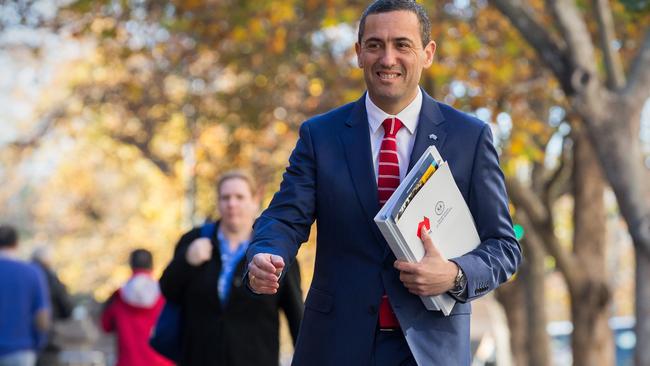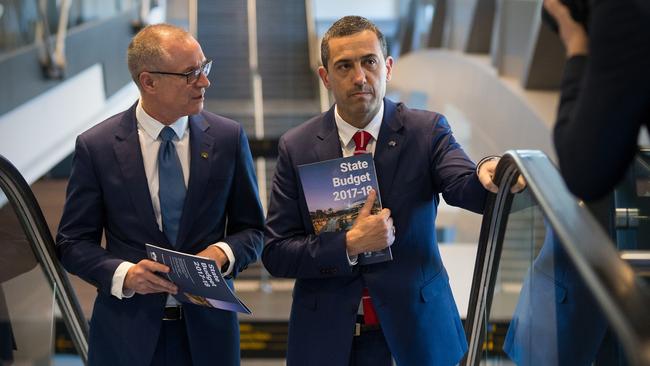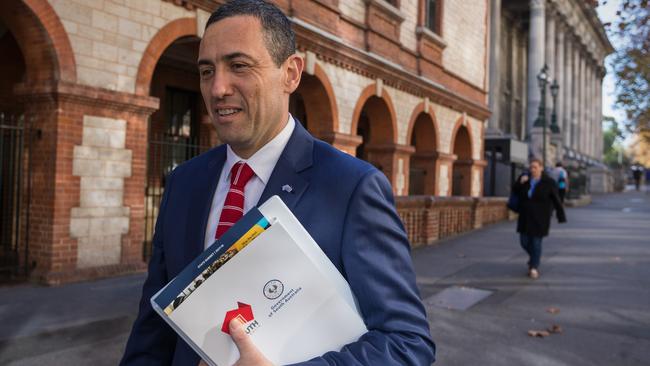David Penberthy: South Australia State Budget 2017 is a work of evil genius
THE State Budget creates a massive new revenue stream for a tired old State Government by belting a deeply unpopular sector of the business community with a gigantic tax, writes David Penberthy.

Opinion
Don't miss out on the headlines from Opinion. Followed categories will be added to My News.
- Tom Koutsantonis delivers South Australia State Budget
- Five minute guide to the South Australia State Budget
- Daniel Wills analysis: What the South Australia State Budget means
- Phil Sutherland: Tom Koutsantonis needs to do a Tom Playford
THIS is a work of evil political genius. The 2017 State Budget creates a massive new revenue stream for a tired old State Government by belting a deeply unpopular sector of the business community with a gigantic tax.
Over the next four years it will inject some $370 million into state coffers, all of it to be spent on job creation and public works. And on the cusp of an election, it lets Labor ask a politically explosive question of its Liberal opponents. Whose side are you on, that of South Australia, or the banks?
In an audacious act of mimicry, Jay Weatherill and Tom Koutsantonis have followed Canberra’s lead with the imposition of a new tax on SA’s share of the liabilities held by Australia’s big five banks. The tax will raise about $90 million a year.
It is a very easy political sell for the Government. None of these banks are crying poor — we are talking here about the Commonwealth Bank, ANZ, Westpac, NAB and Macquarie — institutions whose quarterly profit statements leave most people sputtering with disbelief over their cornflakes.
There are strong arguments as to why Australia needs a robust banking sector, and how we should feel grateful that we weathered the worst of the global financial crisis on account of having a commercially viable group of banks that did not need to cut corners or resort to desperate loan tactics to stay solvent.

But none of that will resonate with put-upon customers, or frazzled small business owners, many of whom have bad stories to tell about their dealings with their bank, or with the average punter who feels sickened by the profits and executive salaries that are accepted as standard in the remote world of banking.
Conservatives might regard this State Budget as class war stuff, and it is. But in a political sense, there is a very real chance that it might work. This is because it puts the Liberals in the unenviable position of having to go into bat for a sector of the economy many people despise, should they be politically naive enough to do so.
Of course, the only reason Labor has decided to start belting the banks is because every other measure it has taken (or not taken) to arrest our flagging economy and jobs market has been a failure.
Aside from the cost and reliability of power, unemployment remains the biggest challenge facing SA. And it is here where the Premier has opted for what he is happy to see described as GFC-style stimulus spending, fast-tracking road and infrastructure projects to underpin jobs.
While there isn’t a person in Adelaide who doesn’t complain about the preponderance of roadworks everywhere, you shudder to think what our already-parlous unemployment rate might look like if these projects weren’t already underway.
The message out of yesterday’s Budget is, get used to it as, with the Holden closure on the horizon, the Government has decided that rebuilding our roads and suburbs will be one of its chief weapons to steer us away from double-digit unemployment.
The other ally in fighting unemployment is of course the business community, and it’s here where the government has tried to relieve the burden by expanding the existing payroll tax rebates to an extra 1300 small businesses with an annual payroll of $1.5 million.
The rebate will also be legislated as a permanent incentive for businesses to hire. While this is a good measure, it’s a tremendous pity that in the meaner early years of this term of office the Government still regarded business almost as the enemy.
Having spent the entire state election campaign arguing against the Liberal plan for tax cuts — on the basis that business would only keep the money for itself — the penny seems to have belatedly dropped in the Weatherill camp that we will only get the state out of the mess it’s in with a robust private sector.
With the exception of WorkCover reform, there has been little of note from the Government this term to give business a leg-up. Sure, it made welcome cuts to transactional taxes two years ago, but that so-called “jobs Budget” has been followed by month after month of SA recording the nation’s highest unemployment rate.

Be it on power, the business environment, or the unpopularity of its health plans, the Government has been slow to recognise its problems and even slower to fix them.
It has tried to neutralise the political fallout from the ambitious Transforming Health program by winding back its more contentious elements, principally the relocation of cardiac services from the QEH to the new RAH, and finding new funds (courtesy of the bank tax) for the upgrade of suburban hospitals.
Modbury, the Lyell McEwin, FMC, the QEH. All of these hospitals are in seats Labor needs to hold or regain if it is to have a snowball’s chance of victory at the next state election. In the blink of an eye the government has gone from being parsimonious and pragmatic when to comes to health funding, and is now showering key seats with unforeseen riches.
It proves one thing about fixed terms. They were introduced to put an end to political opportunism but have instead guaranteed it, where the front-end of the four year term is filled with unpopular measures, and the final 12 month home stretch sees the government acting not like paragons of fiscal rectitude, but game show hosts.
That’s why yesterday’s brazen bank robbery is so politically smart.
You can see the narrative of Jay Weatherill’s re-election strategy taking shape out of yesterday’s Budget document. As improbable as Labor’s request for a full 20 years in power might sound, the tactics will be framed around positioning themselves as the party that’s fighting for you. Fighting for better hospitals, fighting for jobs, fighting for a better deal from Canberra.
They are trying to use SA’s weakness — jobs and the economy — as their political strength, saying that things are so tough that you couldn’t possibly risk a change.
It’s an audacious line of argument after they have been in power for so long, underscored when you hear them trawling back through events from last century to attack the Liberals’ record in office.
You would think it should be easy for Steven Marshall to provide the counter argument. History suggests that if anyone has mastered the art of snatching defeat from the jaws of victory, it’s the SA Liberals.
With yesterday’s document, Jay Weatherill has shown he is prepared to change position, reinvent himself, recycle the old, abandon new ideas he once hailed as non-negotiable, all with a view to another four years.
And by picking a fight with the banks, he hopes that Steven Marshall will fall prey to his ideological instincts by decrying a new tax on the one sector of the economy that most people cannot stand.



